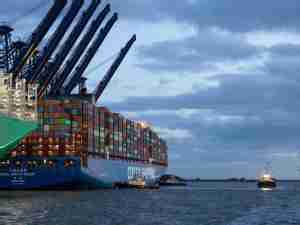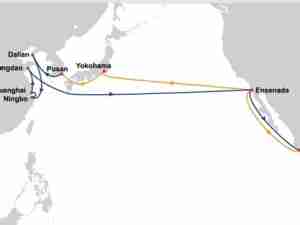The 47,230-ton Liberian-flagged Rena has been stranded on a reef 12 nautical miles off Tauranga on the east coast of New Zealand's North Island since running aground a week ago.
The captain, a 44-year old Philippine national, was remanded on bail without plea to a charge of "operating a vessel in a manner causing unnecessary danger or risk", which carries a maximum fine of NZ$10,000 ($7,810) or 12 months in prison.
Prime Minister John Key said the ship's hull was splitting.
"We have identified stress fractures on the boat so we can't rule out the risk of the ship breaking up," Key told reporters on a visit to the district.
The front half of the 236-metre (775-foot) ship is wedged firmly on the reef with the stern over 90-metre (295-foot) deep water.
Heavy swells and strong winds have pounded the vessel for two days, sending mostly empty containers tumbling off the ship, which is listing at about 18 degrees, into the heaving seas.
Weather forecasters said conditions should slowly improve over the next two days, with wind and seas easing.
Authorities said more than 30 containers have fallen off the ship, with some of them washed up on a small island, Motiti, about eight km (five miles) from the ship, and others bobbing in the sea.
The ship was carrying 1,368 containers, 11 of which are said to have hazardous substances in them. Shipping using the port of Tauranga, which is the country's biggest export port, was being re-routed away from the containers.
Authorities said the bad weather was helping to break up and disperse the estimated 300 tonnes of oil that escaped from the ship.
"That's a little bit frustrating because once the oil is on the beach we can actually deal with it, we can remove it from the beach relatively easily," said Ian Niblock, a spokesman for the clean up operation.
HABITATS UNDER THREAT
Oil is scattered along 25 km (16 miles) of the district's long, golden beaches, which are a magnet for surfers. Nearby waters have an international reputation for big-game fishing.
Several hundred people, including soldiers, were scraping the clumps of thick, toxic, fuel oil, some as large as dinner plates, into plastic bags and large bins.
Strong winds were blowing oil globules onto coastal roads and a strong tar-like smell was forcing some people to wear masks.
"They say the oil could keep washing up for weeks and weeks, that's going to ruin this place for the summer holidays," said local resident Kim Greene.
Key said the New Zealand government would do whatever necessary to ensure the environment and beaches were cleaned up, and hold those responsible to account.
Booms have been placed over some harbour entrances to keep oil out of wetland and wildlife habitats. Hundreds of dead seabirds have been recovered and teams of naturalists have scrubbed and treated scores more for oil contamination.
"It has the potential to not only affect some of our most pristine coastal areas ... but also estuaries and already threatened marine habitats," said Auckland University marine biologist scientist, Barbara Bollard-Breen
The ship's owner, Daina Shipping, a unit of Greece's Costamare Inc. , and its salvage experts, are responsible for the ship's recovery, but any plan needs official approval.
A floating crane able to remove containers from the ship is on its way from Singapore, but will take at least two weeks to arrive. (Reuters)





